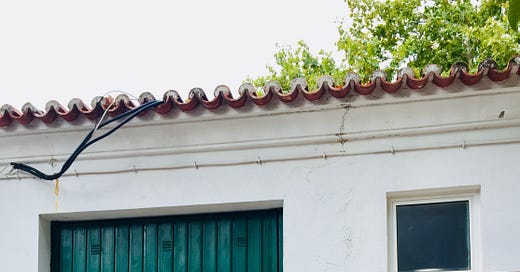From Merriam-Webster:
Legacy, noun.
1. a gift by will especially of money or other personal property; a bequest
2. something transmitted by or received from an ancestor or predecessor or from the past
You don’t have to look far, especially if it's in the direction of social media, lifestyle coaches, or thought leaders (a term that needs to die), to come across the imperative to leave a legacy.
No, not the financial kind, but the second definition above—something one transmits from their lifetime to the future.
To create a legacy that goes on after you die, that forever hangs your name in the firmament of the known and admired, is the topic of every third TED talk, podcast, or YouTube video. Online courses littered across the web promise to help you fulfill your potential with tips on how make your mark.
But what is that mark? Is it a milestone of a life well-lived, or is it residue left behind after we've shuffled off this mortal coil?
I'm suggesting that when we focus on leaving a legacy, it robs us of the life that’s right in front of us.
I've no interest in leaving a legacy, but I don't begrudge anyone who is. I don't think about legacy in any way that shapes my day or life as I’m not achievement-driven. I guess I'm legacy-neutral. If it happens, okay, but if not, it doesn't matter to me.
Leave no Trace
When it’s my time to go, it’s comforting and liberating to know that I will cease to exist, and that cessation includes whatever I create. I'd like to leave behind as little residue as possible, physically and digitally. And if I do leave a legacy worth anyone's interest, I won't know it once I'm gone.
Most legacy-makers leave behind books, films, or time and deeds spent in the public eye. They might live a life of notable achievement until their last days, or they may have had their ten minutes of fame (or infamy) decades before their demise. But even legacy-leavers, once they are gone, won't know what, if any, impact from their life and work remains.
Sure there are notables throughout history who seem immortal through the works they've left behind, like Shakespeare, Michelangelo, and Marie Curie, but who knows how long their legacies will remain?
So many who were remembered already forgotten, and those who remembered them long gone. ~ Marcus Aurelius, Meditations 7.6
Legacy as a Quest
It's reasonable to want to be remembered and to feel that our lives meant something (of which only we can define).
To be thought of with fondness and admiration after we’re gone, only has significance while we’re still here. But to focus on leaving a legacy is to desire immortality. It's the ego's way of striving for eternal recognition.
The ego wants to live forever, but nothing does: trees don't, cities don't, nor do people and the stuff they create.
The ego wants to be special and seen—acknowledgement is the ego's quest.
I wonder how many legacy-seekers ask themselves why they feel it’s imperative to leave a lasting record of their lives. I wonder if they question the ego’s role in this desire.
And while leaving a legacy can be a by-product of a creative life, I argue that it's not the purpose of creating.
To create is intrinsically human, it’s what we do.
I'm not confusing the act of creating with making art; creating is fundamental to life.
We cook, care for others, make things—we do things that harness our intellect and imagination and channel that through our hands. We write, we sing (poorly, in my case), play instruments, build things, etc. The act of living is a daily act of creation.
When we bypass the pleasure of creating for its own sake and enter the ego-arena of making or producing to be noticed, loved, or to gain approval, we shift from joy to agenda. Having a goal or a plan is worthy, but not at the cost of being present, right here and now.
Legacy as Service
Acts of kindness done to benefit others without regard for personal gain or adulation are the opposite of the ego-legacies. Except for a small minority who may have ulterior motives, acts of service are undertaken without thought of future or lasting recognition.
When a legacy is created with its roots in service, the impact could be monumental or felt by just a few. Who's to say the small ripple has less value than the mega-legacies left by people such as Amelia Earhart or Nelson Mandela?
The quiet legacy-makers who help their communities—people may never know them by name, yet still, they bring positive change to the lives of others (I think of the many nonprofits and volunteers I've worked with). I like the idea of discreet legacies versus the shout-y Tony Robbinsesque kind.
Consider: the modest legacies of action or service as we go about our day—isn’t that mark enough to leave on this temporal world?
Your Turn
What do you think of leaving a legacy, personal or professional (but not financial)? Is this important to you? Why or why not?
GOOD THINGS (no bad news, here!)
Kintsugi: The Japanese art of fixing broken pottery via BBC REEL “All things are created and destined to be broken someday.”
Get to Know the Bee Hummingbird, the World’s Smallest Bird (only found in Cuba!) via the Audubon
This Portuguese Island Is Inviting Remote Workers to a Swoon-worthy 'WFH' Setting via Travel and Leisure
—> If you enjoy life: examined, please support by sharing it—and if you want, you can buy me a coffee. Thank you—it keeps me caffeinated, inspired, and writing!





When I was young I always thought I would have some sort of huge and wonderful impact on the world. Reality, I am super lazy!! If I can make a person smile though, that's all the legacy I need. The bonus is I'm still around to enjoy it.